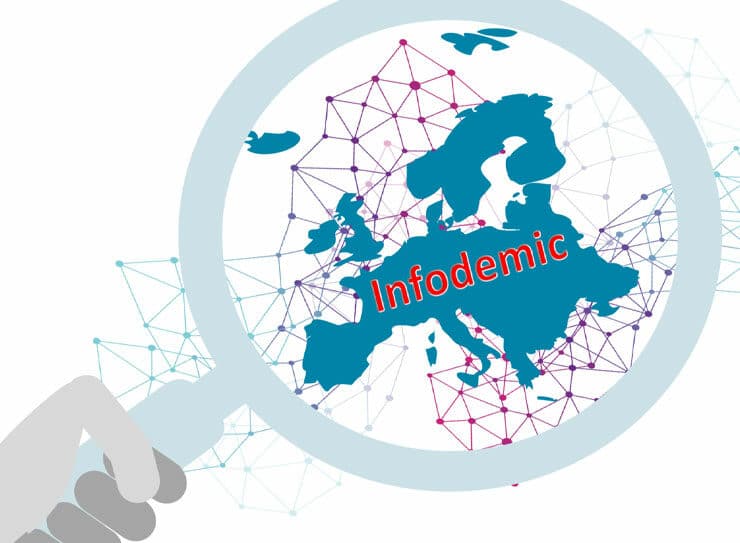15 July 2020
The Covid-19 Infodemic as a Wakeup Call
Blog Post by Miroslava Sawiris, GLOBSEC The pandemic raises the importance of systematic solutions against disinformation. Covid-19 pandemic is typically […]

Blog Post by Miroslava Sawiris, GLOBSEC The pandemic raises the importance of systematic solutions against disinformation. Covid-19 pandemic is typically […]

Blog Post by Miroslava Sawiris, GLOBSEC
The pandemic raises the importance of systematic solutions against disinformation.
Covid-19 pandemic is typically discussed as an undeniable global catastrophe. However, this cataclysm may raise the importance of addressing the deployment of disinformation and conspiracy theories through influence operations, whose ongoing impact threatens national and international interests worldwide.
The problem has grown so large, it cannot be overlooked anymore
There is virtually no sphere immune from the disruptive impact of information operations. The amount of disinformation and conspiracy theories accompanying the Covid-19 pandemic has made this very clear.
Experts monitoring disinformation and influence operations have warned about the implications of this phenomenon for years, particularly in relation to foreign state actors. These use influence operations as a means for asymmetric warfare, in order to manipulate populations of the target state. However, influence operations are also waged by plethora of other actors, from domestic political to international economically motivated networks disseminating disinformation for profit.
The pandemic has been accompanied by what the WHO calls an ‘infodemic’, a flood of confusing and potentially harmful information circulating in the online environment. Digital platforms enable spread of disinformation through their economic model of sensationalist content algorithmic promotion. This is because such content is more engaging, motivating users to spend more time on the platform which in turn generates more advertisement revenues. This is where influence operations’ objectives and economic interests of the digital platforms collide.
Disinformation can polarise societies, cause economic harm but it can also kill
Covid-19 pandemic has clearly demonstrated what happens when an existential risk posed by the virus is combined with a virtual environment fostering spread of emotionally charged and factually unverified content to a highly susceptible audience. The ensuing chaos has been further exacerbated by “information vacuum” which this unprecedented existential situation created. In an environment where even expert interpretation of the circumstances has been developing and changing rapidly, a lot of misinformation was disseminated unwittingly by sharing unverified information.
Influence operations are not just a theory to explain away ‘alternative’ points of view. Disinformation disseminated with the intent of exploiting the pandemic for profit or political gain has led not only to economic loss, damage of property and infrastructure, but also to avoidable deaths.
Solutions need to take marginalised voices into account
As alarming as these facts are, perhaps they represent a much needed wake up call for an urgent systematic action. The European Union has been trying to address the spread of disinformation through social media platforms by implementing Code of Practice on Disinformation.
As several assessments of the Code of Practice argue that its implementation does not go far enough, a robust piece of legislation, the European Digital Services Act, is about to be introduced at the end of the year. It strives to address issues relating to lack of transparency around digital platforms’ reporting on measures taken against promotion of disinformation as well as address the complex question of digital platforms’ responsibility in dissemination of illegal content. Many looks to it as the first potential backbone of the new democratic European digital space which is a tall order to live up to.
In the meantime, the European market is being fragmented by implementation of legislative solutions on national basis, in the absence of Union-wide regulation. Countries such as Germany, have stronger negotiating position vis-à-vis digital platforms due to the size of their markets while smaller states, such as the Hungary or Slovakia, bear the brunt of unregulated digital space.
For this reason, GLOBSEC has initiated an Alliance for Healthy Infosphere to join forces between Czech, Slovak and Hungarian civil society initiatives, think tanks and private companies. The alliance contributes to the discussions about digital space regulation and aims to ensure that experience of these markets is reflected in policy making initiatives. Whole of society approach is the only way to efficiently address differing interests of the many stakeholders involved to make sure all perspectives are considered in the adopted solutions.
Miroslava Sawiris, Research Fellow within the Democracy and Resilience Programme at the GLOBSEC Policy Institute
This article is produced in cooperation with Visegrad Insight.